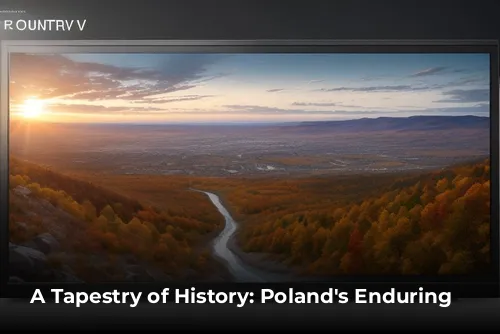Nestled in the heart of Europe, Poland holds a unique position, connecting the verdant forests of northwestern Europe with the bustling waterways of the Atlantic Ocean and the fertile plains of the Eurasian frontier. Throughout its rich and turbulent history, Poland’s borders have shifted like the sands of time, influenced by the powerful forces of its surrounding nations.
From the dawn of the Middle Ages, Poland’s nascent principalities and towns were repeatedly overrun by waves of invaders, including Germans, Balts, and Mongols. However, despite these challenges, Poland rose to prominence in the 16th century, becoming the largest state in Europe and a dominant power on the continent. Yet, fate had a cruel twist in store. During the Partitions of Poland (1772-1918), this once-mighty nation was systematically dismantled and divided among the empires of Russia, Prussia, and Austria.
Resilience in the Face of Adversity
Despite the devastating setbacks of the partitions, Polish culture refused to be extinguished. It blossomed even in exile, carried by the flames of revolutionary ideals. Polish patriots like Kazimierz Pułaski and Tadeusz Kościuszko played instrumental roles in the American Revolution, inspiring their own fight for freedom. Poland’s own constitution of 1791, the oldest in Europe, embodied the principles of the American and French Revolutions, reflecting the nation’s deep commitment to democracy.
As a testament to their enduring spirit, Poles emigrated in large numbers to countries like the United States, Canada, Argentina, and Australia, carrying their vibrant culture with them. Simultaneously, Polish artists of the Romantic era, such as the renowned pianist Frédéric Chopin and the brilliant poet Adam Mickiewicz, illuminated the European continent with their genius. This legacy continues to this day, with Polish intellectuals, musicians, filmmakers, and writers enriching the world’s artistic landscape.
A Century of Trials and Triumphs
Poland regained its independence in 1918, but the 20th century proved to be a relentless test of its resilience. The nation was scarred by the devastation of two world wars, with World War II inflicting an unimaginable tragedy, almost entirely wiping out the historically significant Jewish population in the Holocaust. Millions of non-Jewish Poles also perished, victims of ongoing partitions and conquests.
After the fall of the Third Reich, Poland’s independence was once again snatched away, as it became a Soviet satellite state, trapped in the grip of a communist regime for nearly half a century. However, the spirit of resistance refused to be quelled. Polish workers, bolstered by the dissident Catholic Church, challenged the failures of the Soviet system, paving the way for a momentous change.
The Birth of a New Poland
In the late 1970s, a movement called Solidarity (Solidarność) emerged in the shipyards of Gdańsk, fueled by the determination of workers who dared to dream of a better future. Despite the arrest of Solidarity’s leaders, its message of hope resonated throughout the country, spreading through underground newspapers. In the spring of 1989, the Polish government crumbled, marking the beginning of a swift transformation into a democratic nation.
This transformation was not without its challenges, as the Nobel Prize-winning poet Wisława Szymborska eloquently observed. Despite the hardships, Poland emerged from the shadows of communism, embracing a market-based democracy and becoming a member of NATO and the European Union.
A Land of Beauty and Resilience
Poland’s landscape is a symphony of natural beauty, adorned with majestic forests and rivers, sprawling plains, and towering mountains. The capital city of Warsaw (Warszawa) is a captivating blend of modern architecture and historic buildings, meticulously restored after the devastation of World War II.
Other cities steeped in history and culture beckon visitors, including Poznań, home to Poland’s first bishopric, Gdańsk, a vibrant port on the Baltic Sea, and Kraków, a historic center of arts and education, forever linked to the legacy of Pope John Paul II. This remarkable individual embodied the Polish spirit of resilience and their pursuit of peace and independence in the modern world.




